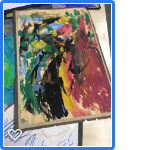Integrated Arts in Education – Week 1
This week saw us being introduced to our Integrated Arts module, where we explored Visual Arts and Music. These are both subjects that I have little experience in and do not feel particularly confident about. Throughout this module I aim to keep an open mind and immerse myself in everything that this module entails to ensure that my confidence grows, and I can pass this on to my future pupils.
In a time where it seems everything is becoming digitalised it can sometimes be hard to remember the joy children gain from being able to create work with paint, paper or musical instruments. It gives them a freedom to express themselves in different ways and use their imagination. Arts in education can be seen a time filler and not enough time is dedicated to this area of the curriculum. It has been noted that there are direct links that involvement in the arts is associated with gains in math, reading, cognitive ability, critical thinking and verbal skills”. (Edutopia, 2009)
In our Visual Arts workshop, we had the opportunity to view art that has been produced by children over the decades. We looked at 3 different developmental stages as identified by Lowenfield & Brittain (1987). The 3 stages that we witnessed work from was the pre-schematic stage (age 4-7), the schematic stage (age 7-9) and the gang stage (age 9-12). The stage that most interested me was the pre-schematic stage. Often drawings/paintings from young children may look no more than scribbles however as stated by McAullife, D (2007) “children have a natural interest in the shape, movement and location of objects and have an innate desire to express emotions and communicate with others through visual representations”. I believe that the paintings I saw were more than a scribble to the child who had produced it. If asked I am sure this child would have been able to tell a story behind their drawing and what each colour or line represented. I also believe that these paintings show complete freedom of the child’s imagination and they are not yet concerned with how others may perceive their art work.

In our Music workshop we explored the benefits of music education. This can extend into other parts of the curriculum and also into other areas of life. As documented by the AEP (2011) music education improves recall and retention of verbal information, advances maths achievement and boosts reading and English language arts skills. Music education can also help sharpen student attentiveness, strengthen perseverance, equip students to be creative and support better study habits and self esteem. It has also been found that music majors are the most likely group of college graduates to be admitted to medical school.
We experienced a music lesson that could be delivered from an early years setting, progressing onto first level. This was a simple lesson where we had to find and keep the beat. This was done initially by clapping our hands to a simple beat through to making the learning more complex by introducing drumsticks and music. This lesson had the whole class engaged and everyone seemed to enjoy it. I also felt that as we weren’t learning in the traditional classroom setting of sitting behind a desk it broke down some of the social barriers that we can sometimes face. This session has re-affirmed to me that although I do not play a musical instrument I will still be able to deliver music education.
REFERENCE LIST
Arts Education Partnership (2011) Music Matters:How Music Education Helps Students Learn, Achieve & Succeed:Washington DC
Edutopia (2009) Why Arts Education is Crucial, and Who’s Doing it Best [Online] Available at: ww.edutopia.org/arts-music-curriculum-child-development [Accessed:17 September 2018]
McAuliffe, D (2007) Teaching Art & Design 3-11 London:Continuum

